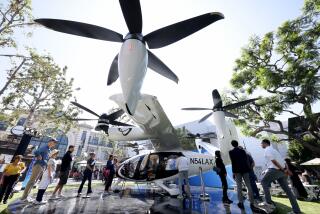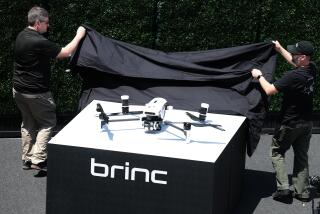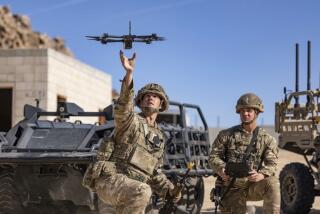Will Amazon’s drone delivery system become reality any time soon?
Online retail giant Amazon.com revealed its dream of same-day delivery using an innovative system that relies on drone aircraft.
Dubbed Prime Air, the plan is to get 5-pound packages into customers’ hands in half an hour or less.
Television newsmagazine “60 Minutes” ran a segment in which company Chief Executive Jeff Bezos said that Amazon could optimistically take four to five years before the plan gets off the ground.
But it’s likely to take longer.
Drones entered the worldwide spotlight with the U.S. government’s reliance on the technology in combat. But as technology becomes more advanced, demand increases for using drones in the commercial world.
Oil and gas companies want to utilize them to keep an eye on their pipelines. Farmers in Japan already use small drones to automatically spray their crops with pesticides. The idea of using drones as transport vehicles has been discussed as a way to deliver tacos and Domino’s pizza.
But drones can’t fly in the U.S. except with permission from the Federal Aviation Administration. The agency has said that remotely piloted aircraft aren’t allowed in national airspace on a wide scale because they don’t have an adequate “detect, sense and avoid” technology to prevent midair collisions.
As interest in drones has increased, the FAA has been working toward easing restrictions. Last month, the agency published a plan that sets the stage for small drones to be flown in U.S. airspace in 2015.
The agency has been working on a plan for years.
Amazon posted an 80-second video on YouTube showing how its drones would work on Sunday night -- hours before the biggest day of the year in online retail, called Cyber Monday.
In the video, a small item makes its way down a conveyor belt before being dropped into a yellow plastic container and picked up by a drone. The aircraft zips away, soaring over a grassy field before depositing the package at a shopper’s doorstep.
“Their announcement definitely raises awareness about our industry,” said Gretchen West, executive vice president of the Assn. for Unmanned Vehicle Systems International, a robotics trade group. “But the reality is that it’s still a few years away from becoming a workable idea.”
There are safety and privacy concerns about drones with high-powered cameras flying over populated areas. Imagine a cargo-carrying drone dropping out of the sky or crashing through a window.
Representatives of the Electronic Frontier Foundation and American Civil Liberties Union have voiced their worries about drones outfitted with cameras spying on people.
These fears were so strong that voters in one small Colorado town proposed an ordinance that would grant hunting permits -- at $25 a pop -- to shoot down drones.
The FAA later said such an act would result in “criminal or civil liability.”
The possibility of drones flying freely above populated areas and carrying out commercial missions is still a ways off. This summer, the FAA gave away two first-of-its-kind certificates that permitted operators to fly drones for commercial purposes.
One of them was given to a company to fly in the North Slope region of the Arctic. The other gave permission for use off the Alaska coast to survey ice flows and whale migration.
Still, Amazon represents the first big-name company with a compelling business case for using the technology. Up until now, all other proposals have had the “giggle factor,” West said.
“This definitely opens the door to using [drones] as delivery systems,” she said. “The technology is advancing every day.”
ALSO:
L.A. billionaire Elon Musk protests media scrutiny after Tesla fires
Cold War-era ‘Warthog’ plane targeted for retirement amid budget cuts
More to Read
Inside the business of entertainment
The Wide Shot brings you news, analysis and insights on everything from streaming wars to production — and what it all means for the future.
You may occasionally receive promotional content from the Los Angeles Times.











